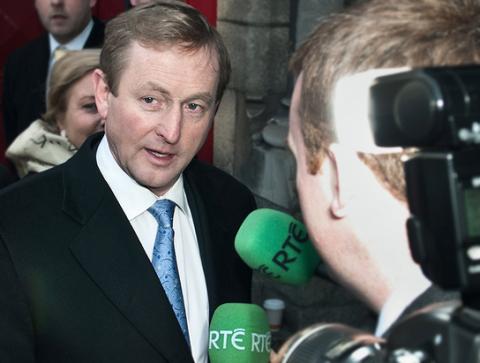Government and Vatican guilty of evasions in responses to Cloyne

It is obvious that whoever wrote the Enda Kenny's July 20 speech on the Vatican overreached themselves, which is hardly good enough on an issue as sensitive as this. By Vincent Browne.
In the Dáil on July 20, in that celebrated speech berating the Vatican, Enda Kenny said the Holy See sought to ‘‘frustrate an inquiry in a sovereign, democratic republic as little as three years ago, not three decades ago’’.
Shortly after he made the speech, the Irish Times asked the Taoiseach what he was referring to when he mentioned an event of ‘‘three years ago’’.
A spokesman said that Kenny wasn’t referring to any specific incident; it was, rather, a figure of speech.
Diarmuid Martin, the Catholic Archbishop of Dublin, said that Kenny’s claim needed verification. He said there was no evidence in the Murphy report about clerical sex abuse in the Cloyne diocese to substantiate the Taoiseach’s claim.
Eamon Gilmore was asked what evidence there was to substantiate the Taoiseach’s claim that, as recently as three years ago, the Vatican had attempted to frustrate the Murphy inquiry.
‘‘Let’s be clear about the specifics,’’ Gilmore replied. ‘‘Children were abused. Let’s not be distracted now, let’s not miss the point.’’ Continuing to miss (or evade) the point, he said: ‘‘Children were abused, it was not handled appropriately by the Church.
‘‘We brought that to the attention of the Vatican and asked for their response. We are not going to be dragged into a prolonged semantic debate about standing up this phrase or that phrase.’’
In its statement last Thursday night on the Vatican’s response to the Cloyne report, the Government sidestepped Archbishop Martin’s question.
Then later last Thursday night, and again last Friday morning, Minister for Justice Alan Shatter came up with an answer that, apparently, nobody else - including Kenny himself - had thought of. It was that the Papal Nuncio had failed, in 2008, to bring to the Murphy Commission’s attention the letter written by a previous nuncio in 1997.
This said that the guidelines drawn up by the bishops on how allegations of clerical sex abuse should be handled was merely a ‘‘study’’ document, a response which allowed the pretext that the guidelines were not to be taken seriously by the Catholic clergy.
How does that explanation fit with Kenny’s own ‘‘clarification’’ (communicated through his spokesman) that he wasn’t referring to a particular incident, and the remark was merely a figure of speech?
And how does it fit with Gilmore’s waffle when Martin’s question was put to him? It’s obvious that whoever wrote the July 20 speech for Kenny overreached themselves, which is hardly good enough on an issue as sensitive as this.
The Vatican itself also avoided some key issues in its response to the Cloyne report.
In particular, it avoided explaining why it had refused even to answer communications addressed to it by the Murphy commission, and why it had failed to provide the information requested. That certainly was an attempt to ‘‘frustrate an inquiry in a sovereign, democratic republic’’, but that was much longer than three years ago, although that hardly matters.
The explanation for the nuncio’s letter of 1997 has some plausibility, but only allowing for the cocoon which these Catholic prelates inhabit.
The nuncio was referring not to the guidelines whereby the Church would cooperate with the civil authorities, but how the guidelines fitted with canon law.
There is a plausible claim that the guidelines in that context might facilitate a perpetrator of abuse to escape the canon law disciplines. But the manner in which that letter was phrased did - arguably, at least - give a pretext for clerics to refuse to cooperate with the civil powers.
However, it is obvious, as Martin has pointed out, that the letter had no such impact on the Irish bishops, for they went ahead anyway to agree the guidelines unanimously.
The problem was that not all bishops adhered to what they had agreed. The cocoon is relevant to the whole issue of the cover-up of clerical child sex abuse in a way that I find troubling.
If one believes, as Catholic bishops presumably do, that the institution of the Catholic Church was founded by Jesus, who is God, and that the purpose of this initiative was to provide an agency through which humankind would be saved from eternal damnation, then surely the Catholic Church itself is a profoundly sacred institution whose interests and welfare surpass in importance not just every other institution (including sovereign states) but the interests and welfare of every other entity, including human beings, even children.
Given that, is not the reputation and standing of the Catholic Church of paramount importance, superior even to the welfare of children?
After all, we are talking about eternity here and, even if a person’s life is blighted from childhood because of clerical abuse, what is that in the context of eternity, and what is it in the context of the agency that is divinely ordained to salvage all humankind from damnation in all eternity?
There seems to be a problem here.
Image top: Tom Szustek.
